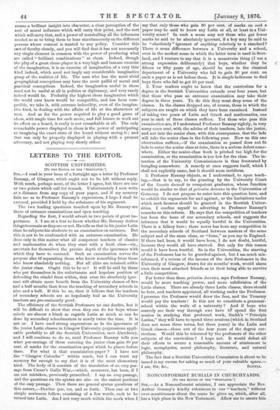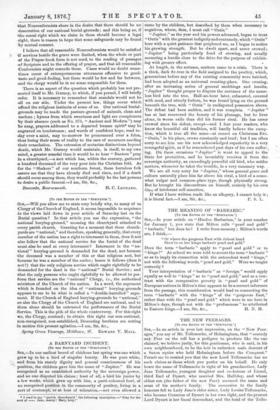NONCONFORMIST BURIALS IN CHURCHYARDS.
[TO THE EDITOR OF THE "SPECTATOR.")
Sin,—As a Nonconformist minister, I can appreciate the Rev. Arthur Gurney's kindly references to our "teachers," without over-sensitiveness about the name he gives us, which, after all, has a high place in the New Testament. Allow me to assure him that Nonconformists share in the desire that there should be no d esecration of our national burial-grounds ; and this being so, if the moral right whic.h we claim in them should become a legal Tight, there is reason to hope that some safeguards may be found by mutual consent.
I believe that all reasonable Nonconformists would be satisfied ill services beside the grave were limited, when the whole or part of the Prayer-book form is not used, to the reading of passages of Scripture and to the offering of prayer, and that ill reasonable Conformists might concede these. Cases would no doubt some- times occur of extemporaneous utterances offensive to good- taste and good-feeling, but these would be few and far between, and the clergy would be in no sense responsible for them.
There is an aspect of the question which probably has not pre- sented itself to Mr. Gurney, to which, if you permit, I will briefly 'refer. It is necessary to remember that scandals would not be all on our side. Under the present law, things occur which Offend the religious instincts of some of us. Our national burial- grounds may be made the pasture-ground of animals, clean and unclean ; hymns from which sweetness and light are conspicuous by their absence (such as No. 375, "Ancient and Modern ") may be sang, prayers addressed to a departed human spirit* may be -engraved on tombstones ; and words of confident hope, read to- 'day over a saint, may to-morrow be pronounced over a felon, thus losing their sense of reality to the ears of mourners needing their consolation. The extension of sectarian distinctions beyond d eath, which Mr. • Gurney would maintain, is itself, to my own mind, a greater scandal than it would be to hear "Ranters "pray in a churchyard;—a Sect which has, within the century, gathered 4% hundred thousand of the very poor into the Christian fold. As 'for the "Shakers" of our southern forest, these harmless folk assure me that they have already died and risen, and if a death should occur among them, they would probably be the last persons to desire a public funeral.—I am, Sir, &c.,



































 Previous page
Previous page